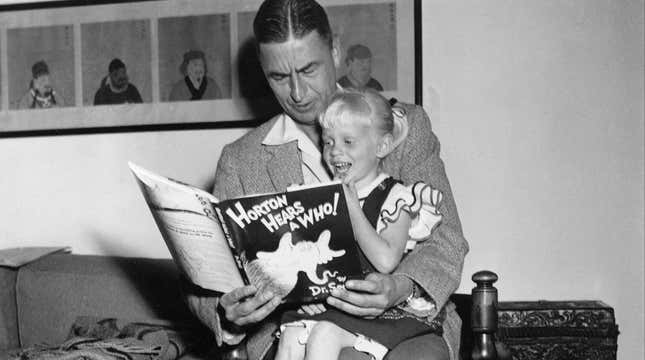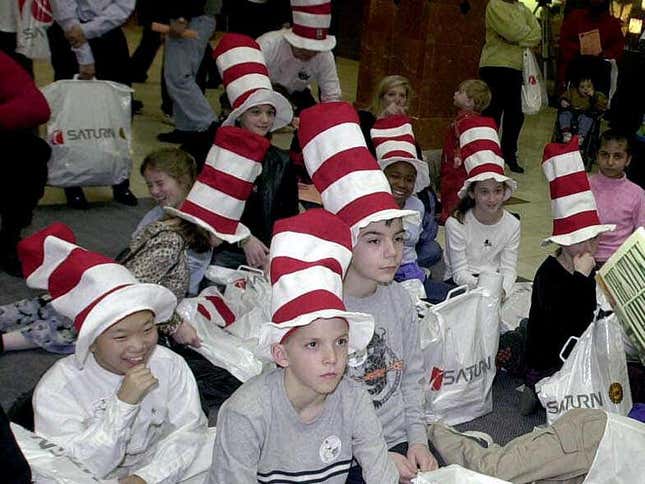The Right Is Going Nuts Over a Nonexistent Attempt to Ban and 'Cancel' Dr. Seuss [UPDATED]
Politics![The Right Is Going Nuts Over a Nonexistent Attempt to Ban and 'Cancel' Dr. Seuss [UPDATED]](https://img.pastemagazine.com/wp-content/juploads/2024/01/inimj4t7ykpiujmmbuky.jpg)

The right has attached itself to the latest casualty of the cancel culture wars: Late children’s book author Dr. Seuss.
On Tuesday, Dr. Seuss Enterprises, the organization which owns the rights to the books and characters of Theodor Seuss Geisel—better known as Dr. Seuss—announced that it would no longer distribute or license a handful of Seuss books that include outdated racist caricatures and contradict their “mission” of “hope, inspiration, inclusion, and friendship.”
“[Dr. Seuss Enterprises], working with a panel of experts, including educators, reviewed our catalog of titles and made the decision last year to cease publication and licensing of the following titles: And to Think That I Saw It on Mulberry Street, If I Ran the Zoo, McElligot’s Pool, On Beyond Zebra!, Scrambled Eggs Super!, and The Cat’s Quizzer,” read the statement. “These books portray people in ways that are hurtful and wrong.”
As NPR’s Code Switch noted last week, the portrayals have not aged well (emphasis ours):
But some of Seuss’ classics have been criticized for the way they portray people of color. In And To Think That I Saw It On Mulberry Street, for example, a character described as Chinese has two lines for eyes, carries chopsticks and a bowl of rice, and wears traditional Japanese-style shoes. In If I Ran the Zoo, two men said to be from Africa are shown shirtless, shoeless and wearing grass skirts as they carry an exotic animal.
Code Switch added that this racism was also reflected in Geisel’s personal life, which includes writing “an entire minstrel show in college and perform[ing] as the main character in full blackface.”
Geisel’s racism is old news in the same way that Roald Dahl’s antisemitism is: It might not be common knowledge, but those who know, know, and while it may not tarnish the brilliance of The B.F.G or Matilda, it’s unfortunate all the same. Those in charge of Dr. Seuss’s cultural legacy, understandably, would prefer not to elevate Dr. Seuss books promoting stunted racist stereotypes that were unfortunately common in the 1920s, but are widely acknowledged as archaic and unacceptable in the 2020s.
There’s a reasonable concern to be had over the urge to strenuously edit and censor the racism out of classic literature: a decade ago, such an effort was made with Huckleberry Finn. Editing books to be more palatable to contemporary values is a well-meaning but flawed way of reckoning with the past, and they should be taught and analyzed as products of their time.
But this isn’t about Huckleberry Finn, this is about a handful of miscellaneous, lesser-known Seuss titles that the average person has never heard of and certainly hasn’t read. They lack the cultural relevance of true Seuss classics like The Cat in the Hat or Green Eggs and Ham, and are unlikely to be missed from store bookshelves or classrooms. Concern over racist undertones in Seuss’s books is not a new one: Literary and library organizations have been addressing it for years. And now, the Seuss organization decided to file a handful of the worst offenders to their archives, and that is their prerogative. It’s not worth starting a culture war over.
Unless you’re on the right.
-

-

-

-

-

-

-

-

-

-

-

-

-

-

-

-

-

-

-

-

-

-

-

-

-

-

-

-

-

-

-

-

-

-

-

-

-

-

-

-









































